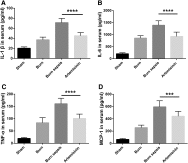Artemisinin protects mice against burn sepsis through inhibiting NLRP3 inflammasome activation
Correspondence
- Corresponding author at: Department of Emergency, Sun Yat-Sen Memorial Hospital, Sun Yat-Sen University, 107 Yan-Jiangxi Road, Guangzhou 510120, China. Tel./fax: +86 02081332648.

Correspondence
- Corresponding author at: Department of Emergency, Sun Yat-Sen Memorial Hospital, Sun Yat-Sen University, 107 Yan-Jiangxi Road, Guangzhou 510120, China. Tel./fax: +86 02081332648.
 Article Info
Article Info
To view the full text, please login as a subscribed user or purchase a subscription. Click here to view the full text on ScienceDirect.

Fig. 1
Interleukin 1β, IL-6, TNF-α, and MCP-1 levels in serum of sham burned, burned, burn septic, and artemisinin treated mice were detected by enzyme-linked immunosorbent assay. Data were presented as means ± SD, n = 10 mice/group, ***P < .001, ****P < .0001.
Fig. 2
The relative mRNA expression of ICAM-1 and VCAM-1 in lung and heart of sham burned, burned, burn septic, and artemisinin treated mice were detected by quantitative real-time PCR. Data were calculated by using the 2-ΔΔCt method, where Ct is cycle threshold. n = 10 mice/group, **P < .01, ***P < .001, ****P < .0001.
Fig. 3
Myeloperoxidase activities in lung and heart of sham burned, burned, burn septic, and artemisinin treated mice were detected by a commercial kit according to the manufacturer's instructions. Data were presented as means ± SD, n = 10 mice/group, ****P < .0001.
Fig. 4
Survival rates of mice in burned, burn septic, and artemisinin treated groups were analyzed using the Kaplan-Meier method and compared using the log-rank test. The survival rate of burn septic mice treated with artemisinin was significantly higher than those of nontreated mice until 9 days postburn (58.33% vs 16.67%; P = .0027). n = 12 mice/group, **P < .01.
Fig. 5
A and B, IL-1β and IL-18 relative mRNA expression in cell lysates were detected by quantitative real-time PCR. C, The protein levels of NLRP3 and cleaved caspase 1 were determined by Western blot. β-Actin was used as internal control. Data were presented as means ± SD. Results are representative of at least 3 independent experiments. **P < .01, ***P < .001, ****P < .0001; ns, nonsignificant.
Abstract
Background
NLRP3 inflammasome activation is recently reported to be linked to the pathogenesis of sepsis. Artemisinin is shown to play beneficial effects in sepsis. However, the impacts of artemisinin on burn sepsis have not been investigated. This study is designed to investigate the role of artemisinin in burn sepsis and the involvement of NLRP3 inflammasome activation.
Methods
Male BALB/c mice were randomly divided into sham burn, burn, burn sepsis, and artemisinin treated groups. Inflammatory cytokines were measured by enzyme-linked immunosorbent assay. Adhesion molecules and neutrophil infiltration in lung and heart were detected by real-time polymerase chain reaction. Mortality rates were monitored. Artemisinin was added to Raw 264.7 cells that were stimulated with burn sepsis serum in the presence/absence of an inhibitor of NLRP3 inflammasome, 3, 4-methylenedioxy-β-nitrostyrene. Interleukin (IL) 1β and IL-18 messenger RNA expression as well as NLRP3 and caspase 1 protein were measured.
Results
Production of inflammatory cytokines in serum, levels of adhesion molecules and neutrophil infiltration in lung and heart, and mortality rate of burn septic mice were significantly higher than those of control. These effects were attenuated by artemisinin. Artemisinin down-regulated protein levels of NLRP3 and caspase 1 and inhibited the increases of IL-1β and IL-18 messenger RNA expression from Raw 264.7 cells that were stimulated with burn sepsis serum. These effects of artemisinin were not further strengthened in the presence of 4-methylenedioxy-β-nitrostyrene.
Conclusion
Artemisinin protects mice from burn sepsis by attenuating the inflammatory response and alleviating inflammatory infiltration in vital organs, likely through inhibiting the activation of NLRP3 inflammasome.
To access this article, please choose from the options below
Purchase access to this article
Claim Access
If you are a current subscriber with Society Membership or an Account Number, claim your access now.
Subscribe to this title
Purchase a subscription to gain access to this and all other articles in this journal.
Institutional Access
Visit ScienceDirect to see if you have access via your institution.
Related Articles
Searching for related articles..



